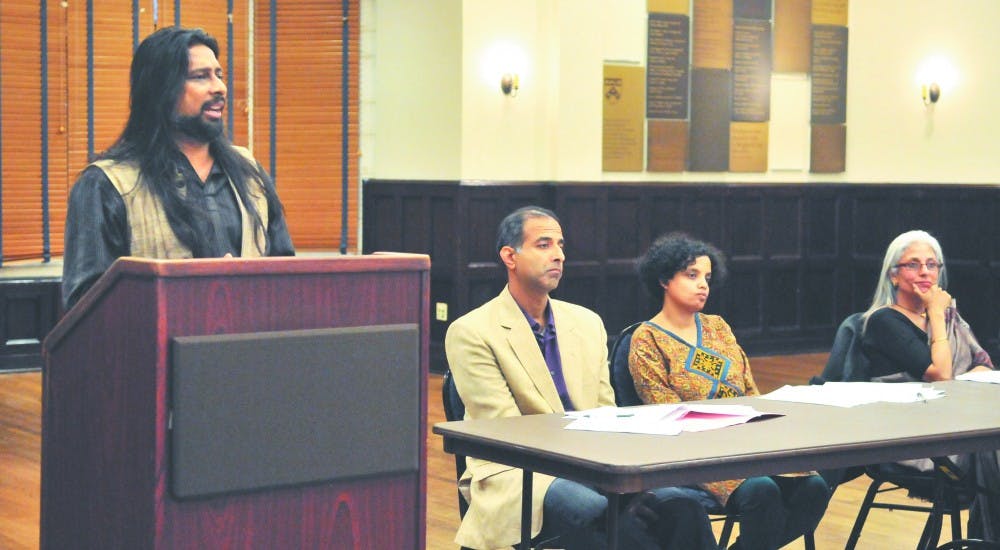
Last night, about 80 people gathered in Houston Hall’s Bodek Lounge for a charged discussion entitled “Debating the Right: Narendra Modi and Penn.”
The discussion, presented by the Penn Government and Politics Association, was formatted as a parliamentary debate. Two professors on each side argued whether the Wharton India Economic Forum had the right to rescind Narendra Modi’s invitation to speak at the Forum in early March.
Modi is the current chief minister of the state of Gujarat in northwestern India.
Arguing in favor of the disinvitation were the sponsors of the petition to revoke Modi’s invitation — English professor Ania Loomba and Toorjo Ghose, a professor at the School of Social Policy & Practice.
Arguing them and in favor of Modi coming to speak were professor of electrical engineering Saswati Sarkar and Aseem Shukla, director of minimally invasive surgery at the Children’s Hospital of Philadelphia.
Shukla opened the debate, lamenting that despite India’s growing importance on the world stage, “people still don’t understand the subtleties … of sociopolitical realities in India.”
Shukla also cited Penn’s ranking as one of the top campuses for free speech. “The University should be a forum for prominent figures,” he urged.
Loomba, co-author of the March petition, presented the opposing side of the discussion, opening with the claim that Modi “was complicit in the riots” that occurred in 2002 and resulted in the death of Muslims and Hindus.
Loomba took specific issue with the characterization of her side of the debate. “Those of us who dared to question whether [Modi] was a fit candidate … to be given a forum [at Penn], have been accused of repressing free speech,” she said.
She also criticized the “Islamophobic language” used against her side. “They caricatured us as intellectual jihadis,” she said.
Contentious rebuttals were offered from each side, first by Sarkar and then by Ghose.
Sarkar was concerned by a recent “campaign of calumny that has been launched against me.” She rebutted the opposition’s claim that she had “shared the stage with Hindu supremacists during the March 23 protests, which targeted the English department.”
Then Ghose took the floor.
“We’re here, in shame, that this is even framed as a debate,” he said. “The facts need to be retold … because our conscience is at stake, our very identity as Indians is at stake.” Ghose also denied claims that the petition he co-authored infringed upon free speech.
“We in fact established free speech by resisting his platform,” he said. “Free speech has been co-opted into a horrendous practice here.”
College freshman Varun Menon, co-founder of GPA, moderated the second half of the debate.
Menon first asked the panelists to comment on Modi’s record on economic development in India.
“All of [the energy policies Modi has pursued] are a model for development,” Shukla said.
Loomba claimed, however, that the other side “could afford to be dispassionate and calm” in their handling of Modi’s development progress, “because [they] were on the side of someone in power.” Both Shukla and Loomba received applause from competing camps within the audience.
“There had been no forum that had been held where there was a discussion of both sides, face-to-face,” Menon said of the event. “This was definitely the most controversial forum we’ve done … it was difficult [to control the audience].”
The Daily Pennsylvanian is an independent, student-run newspaper. Please consider making a donation to support the coverage that shapes the University. Your generosity ensures a future of strong journalism at Penn.
DonatePlease note All comments are eligible for publication in The Daily Pennsylvanian.








